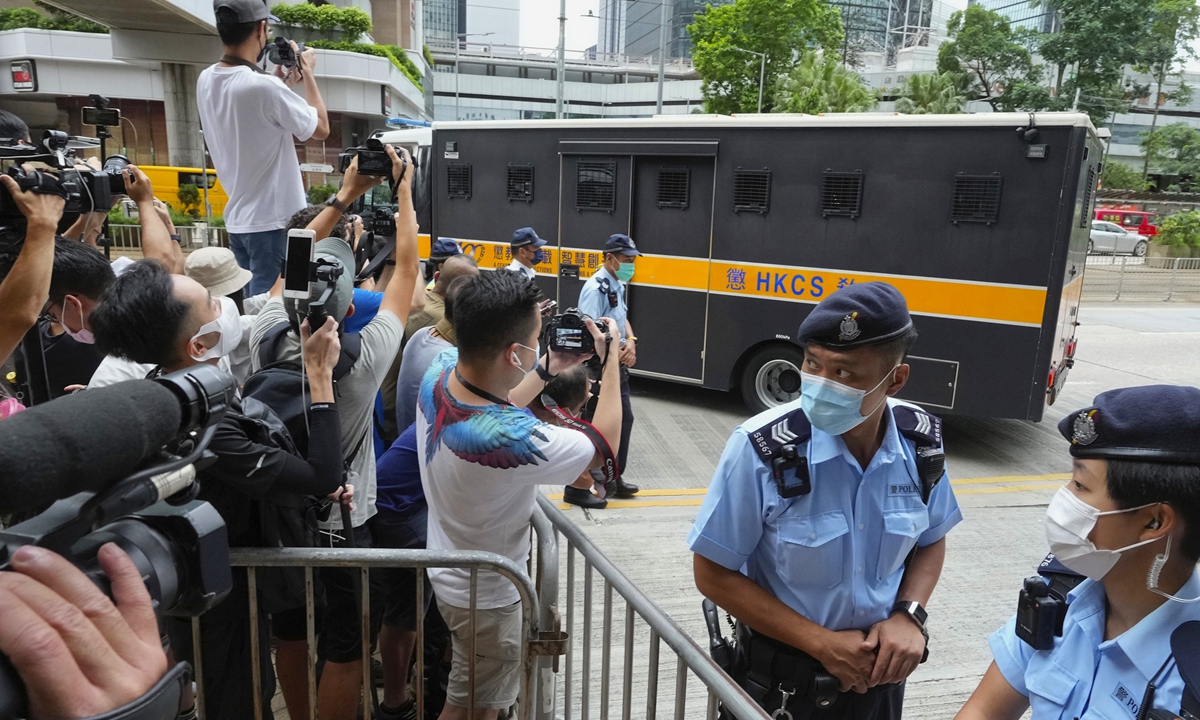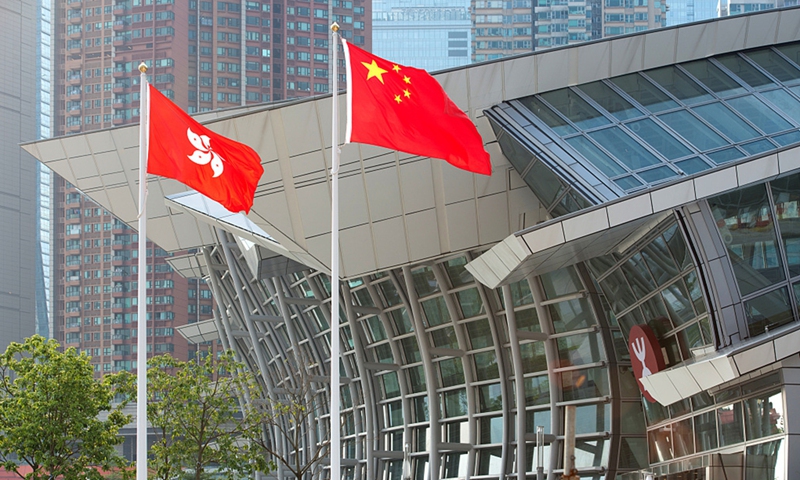1st national security case in HK hands down 9-year sentence, sets strong precedent for radicals

Tong Ying-kit Photo: Ta Kung Pao
Leon Tong Ying-kit, the first person to be convicted under the national security law for Hong Kong Special Administrative Region (HKSAR), was sentenced to nine years in prison due to separatism and terrorist activities, which was hailed by legal experts as a combination of deterrence and fair penalties, setting an example for upcoming national security-related cases.
Tong, 24, was convicted of terrorism and inciting secessionism. On July 1, 2020, one day after the law took effort, Tong rammed a black motorbike into a group of Hong Kong police officers, carrying a banner with the slogan, "Liberate Hong Kong, Revolution of our Times."
The High Court of HKSAR pointed out that the minimum sentence for inciting others to split the country was 6.5 years in jail, and the minimum sentence for terrorism was eight years in prison, Hong Kong media reported.
The court ruled that 2.5 years of the eight-year sentence for terrorism should be carried out in installments with the 6.5-year sentence for inciting secessionism, and the rest of the sentences should be executed concurrently, so the final nine-year sentence was given.
As the first conviction under the national security law for Hong Kong, which was implemented on June 30, 2020, helping restore social stability after months-long social turmoil which turned into a color revolution, the sentencing fully underscored the need for deterrence and the legal fairness, legal experts said, noting that it also has the guiding significance for future cases as reference.
"The sentencing affirmed the authority of the national security law for Hong Kong and exerted the power of the law, laying out a solid foundation for future law enforcement and playing out the deterrence effect among anti-China rioters," Lau Siu-kai, vice-president of the Chinese Association of Hong Kong and Macao Studies, told the Global Times on Friday.
It also shows that judicial institutions in Hong Kong could shoulder the responsibility of safeguarding national security, he said.

Police officers stand guard as a prison truck carrying Tong Ying-kit leaves a court on Friday. Tong was sentenced to nine years in prison for separatism and terrorist activities. Photo: AP
Fair sentencing sets starting point
At about 9 am on Friday, some spectators lined up at the court and dozens of police officers were stationed outside the High Court at noon. However, no counter-terrorism police were sighted, local media reported.
Before the sentencing, some Hong Kong patriotic organizations and citizens held up signs and banners outside the court, reading "Secession should be severely punished," and "Severely punish terrorist activities and put an end to secession."
The sentencing came after three judges reached a decision in the first 15-day trial under the national security law for Hong Kong. Tong was found guilty of inciting secession and terrorism on Tuesday.
In the verdict on Tuesday, the judge said displaying the flag with "Liberate" slogan would have incited others to engage in secession acts, and the defendant had understood the message. The defendant deliberately ran through police checkpoints on a motorcycle and crashed into three police officers, seriously endangering the public and community.
Tong's lawyers pleaded on Thursday that Tong had only displayed the flag, and that there was no evidence that anyone was affected and he was not requesting foreign sanctions to Hong Kong officials. As for crashing into police officers on a motorcycle, his lawyers said Tong was reckless in driving but not intentionally assaulting the officers and should be sentenced to three to 10 years in prison.
"The sentencing is fair and adequate after taking into account the context, background and circumstance of the act, which also embodies the need for deterrence, setting the starting point for these two serious offenses," Lawrence Ma, barrister and chairman at Hong Kong Legal Exchange Foundation, told the Global Times on Friday.
We consider that this overall term should sufficiently reflect the defendant's culpability in the two offenses and the abhorrence of society, and at the same time, achieve the deterrent effect required, the judges said in a sentencing document seen by the Global Times.
Tam Yiu-chung, a member of the National People's Congress Standing Committee from Hong Kong, told the Global Times on Friday that after the sentencing was announced, it can send a warning hopefully to end and prevent relevant activities. "If someone still attempts to challenge the national security law, he will bear criminal responsibilities," he said.
As elements for considering the sentence, the judges said the date of July 1, 2020 was of particular importance as it was the first day of the implementation of the national security law for Hong Kong. Since the onset of Hong Kong's "legislative amendment turmoil" in 2019, anti-China forces seeking to disrupt Hong Kong have blatantly advocated such notions as "Hong Kong independence," "self-determination" and "referendum," and engaged in activities to undermine national unity and split the country.
Legal experts said that Tong's camp ignored the political sensitivity of the special time and the importance of law and order by displaying the slogans of Hong Kong secessionism in public and attracting the attention of the public and media by hitting police is directly.
"It is also a negation and contempt of the constitutional order of the HKSAR and the legal authority of the national security law for Hong Kong," Tian Feilong, a member of the Beijing-based Chinese Association of Hong Kong and Macao Studies, told the Global Times on Friday.
The legislative intention of the national security law also includes strict legal definition and expected punishment for similar words and deeds, and the sentencing was a demonstration of the judge's professionalism, Tian noted.
Following the sentencing, Hong Kong security secretary Chris Tang told media on Friday that a resident who abides by the law would not want to endanger national security, will not unreasonably utter slogans related to "Hong Kong independence," showing the deterrence effect of the first case.

Hong Kong File photo
Doubts dismissed Some foreign media outlets and observers highlighted the so-called controversy over the national security law for Hong Kong, saying the first case was sentenced as the Chinese government tightened controls, and raising doubts about the rule of law and judicial independence of Hong Kong under the law.
"Some rumors such as Beijing is behind the sentencing or threatening judges during the legal procedures came up as those media outlets could not find any point to attack China given the integrity and rigorous legal procedure, and that judges have fully communicated before the sentencing, which are all in line with the law," Lawrence Tang Fei, a member of the Chinese Association of Hong Kong and Macao Studies, told the Global Times.
According to the national security law for Hong Kong, a person can be sentenced to a maximum of 10 years in prison for inciting, assisting in or abetting secession. A person who organizes, plans, commits, participates in or threatens to commit terrorist activities in a grave nature can face life imprisonment.
"The judges said it's not the worst case yet, and they also gave clear reasons with no point to be doubted," Tang said.
According to the Hong Kong Police Force, after the verdict was handed down at 3 pm Tuesday, a judiciary employee received a phone call at around 5 pm from a man who called one of the three judges, Esther Toh Lye-ping, a dog judge, and said he would launch a bomb attack on her.
The man also undermined the other two judges, saying he would also blast them or slash them with a knife.
"Judges had to handle cases in accordance with the law and evidence without any intervention," said the Department of Justice in a late-night statement over the incident on Tuesday.
About complaints that the sentence might be light compared with some terrorists sentenced to life imprisonment in other countries, Ma said one cannot judge the correctness of a sentence by simply reading the label and saying all terrorist offenders will have to get a life sentence.
One has to judge by carefully analyzing the facts and circumstance of each individual case, even if they are all charged under the same offense, to decide how much sentence is suitable, he added.
"Although the sentence is not a Court of Appeal decision [where it is usually for the Court of Appeal to set the sentencing guideline], it is a decision by three High Court judges," Ma added, further claiming it also showed that the three judges have a deeper understanding of the background of the legislature and its genuine intentions.
The verdict will provide an important reference for similar cases, he said, as the deterrent effect will not only punish Tong for committing the crime but also make the public understand that secession is a severe crime, which means they can't shout, spread or print similar messages that suggest "Hong Kong independence."
In terms of evidence, bail, conviction, sentencing, and interpretation of the provisions of the national security law and Hong Kong's common law judicial methods, it has formed preliminary judicial experience of standardization and in procedures, which will be useful to other national security judges in the future, the expert said.
The sentencing is a strong disciplinary critique of Hong Kong's radical social movement and its destruction of the rule of law, which will help guide Hong Kong society, especially the young people, to form a correct view of the rule of law and justice, Tian said.
Judges in Hong Kong will also take it as an opportunity to more accurately understand, interpret and safeguard the constitutional order of the HKSAR and the legislative spirit of the national security law, so that the judiciary in Hong Kong will become the rational and conscious guardian of the "one country, two systems," he added.




